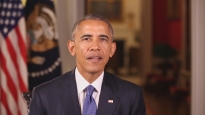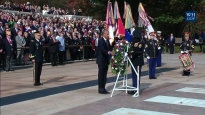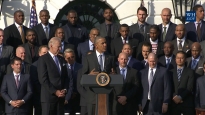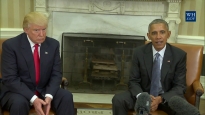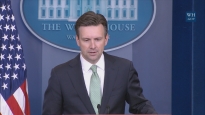President Obama Speaks on Preventing Mass Atrocities
April 23, 2012 | 35:42 | Public Domain
After an introduction by Professor Elie Wiesel, President Obama speaks at the U.S. Holocaust Memorial Museum about honoring the pledge of “never again” by doing everything we can to prevent mass atrocities and genocide, and discusses steps his Administration is taking to make this a reality.
Remarks by the President at the United States Holocaust Memorial Museum
Washington, D.C.
10:00 A.M. EDT
THE PRESIDENT: Good morning, everyone. It is a great honor to be with you here today. Of course, it is a truly humbling moment to be introduced by Elie Wiesel. Along with Sara Bloomfield, the outstanding director here, we just spent some time among the exhibits, and this is now the second visit I've had here. My daughters have come here. It is a searing occasion whenever you visit. And as we walked, I was taken back to the visit that Elie mentioned, the time that we traveled together to Buchenwald.
And I recall how he showed me the barbed-wire fences and the guard towers. And we walked the rows where the barracks once stood, where so many left this Earth -- including Elie’s father, Shlomo. We stopped at an old photo -- men and boys lying in their wooden bunks, barely more than skeletons. And if you look closely, you can see a 16-year old boy, looking right at the camera, right into your eyes. You can see Elie.
And at the end of our visit that day, Elie spoke of his father. "I thought one day I will come back and speak to him," he said, "of times in which memory has become a sacred duty of all people of goodwill." Elie, you've devoted your life to upholding that sacred duty. You’ve challenged us all -- as individuals, and as nations -- to do the same, with the power of your example, the eloquence of your words, as you did again just now. And so to you and Marion, we are extraordinarily grateful.
To Sara, to Tom Bernstein, to Josh Bolten, members of the United States Holocaust Memorial Council, and everyone who sustains this living memorial -- thank you for welcoming us here today. To the members of Congress, members of the diplomatic corps, including Ambassador Michael Oren of Israel, we are glad to be with you.
And most of all, we are honored to be in the presence of men and women whose lives are a testament to the endurance and the strength of the human spirit -- the inspiring survivors. It is a privilege to be with you, on a very personal level. As I’ve told some of you before, I grew up hearing stories about my great uncle -- a soldier in the 89th Infantry Division who was stunned and shaken by what he saw when he helped to liberate Ordruf, part of Buchenwald. And I’ll never forget what I saw at Buchenwald, where so many perished with the words of Sh’ma Yis’ra’eil on their lips.
I’ve stood with survivors, in the old Warsaw ghettos, where a monument honors heroes who said we will not go quietly; we will stand up, we will fight back. And I’ve walked those sacred grounds at Yad Vashem, with its lesson for all nations -- the Shoah cannot be denied.
During my visit to Yad Vashem I was given a gift, inscribed with those words from the Book of Joel: "Has the like of this happened in your days or in the days of your fathers? Tell your children about it, and let your children tell theirs, and their children the next generation." That’s why we’re here. Not simply to remember, but to speak.
I say this as a President, and I say it as a father. We must tell our children about a crime unique in human history. The one and only Holocaust -- six million innocent people -- men, women, children, babies -- sent to their deaths just for being different, just for being Jewish. We tell them, our children, about the millions of Poles and Catholics and Roma and gay people and so many others who also must never be forgotten. Let us tell our children not only how they died, but also how they lived -- as fathers and mothers, and sons and daughters, and brothers and sisters who loved and hoped and dreamed, just like us.
We must tell our children about how this evil was allowed to happen -- because so many people succumbed to their darkest instincts, and because so many others stood silent. Let us also tell our children about the Righteous Among the Nations. Among them was Jan Karski, a young Polish Catholic, who witnessed Jews being put on cattle cars, who saw the killings, and who told the truth, all the way to President Roosevelt himself.
Jan Karski passed away more than a decade ago. But today, I’m proud to announce that this spring I will honor him with America’s highest civilian honor -- the Presidential Medal of Freedom. (Applause.)
We must tell our children. But more than that, we must teach them. Because remembrance without resolve is a hollow gesture. Awareness without action changes nothing. In this sense, "never again" is a challenge to us all -- to pause and to look within.
For the Holocaust may have reached its barbaric climax at Treblinka and Auschwitz and Belzec, but it started in the hearts of ordinary men and women. And we have seen it again -- madness that can sweep through peoples, sweep through nations, embed itself. The killings in Cambodia, the killings in Rwanda, the killings in Bosnia, the killings in Darfur -- they shock our conscience, but they are the awful extreme of a spectrum of ignorance and intolerance that we see every day; the bigotry that says another person is less than my equal, less than human. These are the seeds of hate that we cannot let take root in our heart.
"Never again" is a challenge to reject hatred in all of its forms -- including anti-Semitism, which has no place in a civilized world. And today, just steps from where he gave his life protecting this place, we honor the memory of Officer Stephen Tyrone Johns, whose family joins us today.
"Never again" is a challenge to defend the fundamental right of free people and free nations to exist in peace and security -- and that includes the State of Israel. And on my visit to the old Warsaw Ghetto, a woman looked me in the eye, and she wanted to make sure America stood with Israel. She said, "It’s the only Jewish state we have." And I made her a promise in that solemn place. I said I will always be there for Israel.
So when efforts are made to equate Zionism to racism, we reject them. When international fora single out Israel with unfair resolutions, we vote against them. When attempts are made to delegitimize the state of Israel, we oppose them. When faced with a regime that threatens global security and denies the Holocaust and threatens to destroy Israel, the United States will do everything in our power to prevent Iran from getting a nuclear weapon.
"Never again" is a challenge to societies. We’re joined today by communities who’ve made it your mission to prevent mass atrocities in our time. This museum’s Committee of Conscience, NGOs, faith groups, college students, you’ve harnessed the tools of the digital age -- online maps and satellites and a video and social media campaign seen by millions. You understand that change comes from the bottom up, from the grassroots. You understand -- to quote the task force convened by this museum -- "preventing genocide is an achievable goal." It is an achievable goal. It is one that does not start from the top; it starts from the bottom up.
It’s remarkable -- as we walked through this exhibit, Elie and I were talking as we looked at the unhappy record of the State Department and so many officials here in the United States during those years. And he asked, "What would you do?" But what you all understand is you don't just count on officials, you don't just count on governments. You count on people -- and mobilizing their consciences.
And finally, "never again" is a challenge to nations. It’s a bitter truth -- too often, the world has failed to prevent the killing of innocents on a massive scale. And we are haunted by the atrocities that we did not stop and the lives we did not save.
Three years ago today, I joined many of you for a ceremony of remembrance at the U.S. Capitol. And I said that we had to do "everything we can to prevent and end atrocities." And so I want to report back to some of you today to let you know that as President I’ve done my utmost to back up those words with deeds. Last year, in the first-ever presidential directive on this challenge, I made it clear that "preventing mass atrocities and genocide is a core national security interest and a core moral responsibility of the United States of America."
That does not mean that we intervene militarily every time there’s an injustice in the world. We cannot and should not. It does mean we possess many tools -- diplomatic and political, and economic and financial, and intelligence and law enforcement and our moral suasion -- and using these tools over the past three years, I believe -- I know -- that we have saved countless lives.
When the referendum in South Sudan was in doubt, it threatened to reignite a conflict that had killed millions. But with determined diplomacy, including by some people in this room, South Sudan became the world’s newest nation. And our diplomacy continues, because in Darfur, in Abyei, in Southern Kordofan and the Blue Nile, the killing of innocents must come to an end. The Presidents of Sudan and South Sudan must have the courage to negotiate -- because the people of Sudan and South Sudan deserve peace. That is work that we have done, and it has saved lives.
When the incumbent in Côte D’Ivoire lost an election but refused to give it up -- give up power, it threatened to unleash untold ethnic and religious killings. But with regional and international diplomacy, and U.N. peacekeepers who stood their ground and protected civilians, the former leader is now in The Hague, and Côte D’Ivoire is governed by its rightful leader -- and lives were saved.
When the Libyan people demanded their rights and Muammar Qaddafi’s forces bore down on Benghazi, a city of 700,000, and threatened to hunt down its people like rats, we forged with allies and partners a coalition that stopped his troops in their tracks. And today, the Libyan people are forging their own future, and the world can take pride in the innocent lives that we saved.
And when the Lord’s Resistance Army led by Joseph Kony continued its atrocities in Central Africa, I ordered a small number of American advisors to help Uganda and its neighbors pursue the LRA. And when I made that announcement, I directed my National Security Council to review our progress after 150 days. We have done so, and today I can announce that our advisors will continue their efforts to bring this madman to justice, and to save lives. (Applause.) It is part of our regional strategy to end the scourge that is the LRA, and help realize a future where no African child is stolen from their family and no girl is raped and no boy is turned into a child soldier.
We’ve stepped up our efforts in other ways. We’re doing more to protect women and girls from the horror of wartime sexual violence. With the arrest of fugitives like Ratko Mladic, charged with ethnic cleansing in Bosnia, the world sent a message to war criminals everywhere: We will not relent in bringing you to justice. Be on notice. And for the first time, we explicitly barred entry into the United States of those responsible for war crimes and crimes against humanity.
Now we’re doing something more. We’re making sure that the United States government has the structures, the mechanisms to better prevent and respond to mass atrocities. So I created the first-ever White House position dedicated to this task. It’s why I created a new Atrocities Prevention Board, to bring together senior officials from across our government to focus on this critical mission. This is not an afterthought. This is not a sideline in our foreign policy. The board will convene for the first time today, at the White House. And I’m pleased that one of its first acts will be to meet with some of your organizations -- citizens and activists who are partners in this work, who have been carrying this torch.
Going forward, we’ll strengthen our tools across the board, and we'll create new ones. The intelligence community will prepare, for example, the first-ever National Intelligence Estimate on the risk of mass atrocities and genocide. We're going to institutionalize the focus on this issue. Across government, "alert channels" will ensure that information about unfolding crises -- and dissenting opinions -- quickly reach decision-makers, including me.
Our Treasury Department will work to more quickly deploy its financial tools to block the flow of money to abusive regimes. Our military will take additional steps to incorporate the prevention of atrocities into its doctrine and its planning. And the State Department will increase its ability to surge our diplomats and experts in a crisis. USAID will invite people and high-tech companies to help create new technologies to quickly expose violations of human rights. And we’ll work with other nations so the burden is better shared -- because this is a global responsibility.
In short, we need to be doing everything we can to prevent and respond to these kinds of atrocities -- because national sovereignty is never a license to slaughter your people. (Applause.)
We recognize that, even as we do all we can, we cannot control every event. And when innocents suffer, it tears at our conscience. Elie alluded to what we feel as we see the Syrian people subjected to unspeakable violence, simply for demanding their universal rights. And we have to do everything we can. And as we do, we have to remember that despite all the tanks and all the snipers, all the torture and brutality unleashed against them, the Syrian people still brave the streets. They still demand to be heard. They still seek their dignity. The Syrian people have not given up, which is why we cannot give up.
And so with allies and partners, we will keep increasing the pressure, with a diplomatic effort to further isolate Assad and his regime, so that those who stick with Assad know that they are making a losing bet. We’ll keep increasing sanctions to cut off the regime from the money it needs to survive. We’ll sustain a legal effort to document atrocities so killers face justice, and a humanitarian effort to get relief and medicine to the Syrian people. And we’ll keep working with the "Friends of Syria" to increase support for the Syrian opposition as it grows stronger.
Indeed, today we’re taking another step. I’ve signed an executive order that authorizes new sanctions against the Syrian government and Iran and those that abet them for using technologies to monitor and track and target citizens for violence. These technologies should not empower -- these technologies should be in place to empower citizens, not to repress them. And it’s one more step that we can take toward the day that we know will come -- the end of the Assad regime that has brutalized the Syrian people -- and allow the Syrian people to chart their own destiny.
Even with all the efforts I’ve described today, even with everything that hopefully we have learned, even with the incredible power of museums like this one, even with everything that we do to try to teach our children about our own responsibilities, we know that our work will never be done. There will be conflicts that are not easily resolved. There will be senseless deaths that aren’t prevented. There will be stories of pain and hardship that test our hopes and try our conscience. And in such moments it can be hard to imagine a more just world.
It can be tempting to throw up our hands and resign ourselves to man’s endless capacity for cruelty. It’s tempting sometimes to believe that there is nothing we can do. And all of us have those doubts. All of us have those moments -- perhaps especially those who work most ardently in these fields.
So in the end, I come back to something Elie said that day we visited Buchenwald together. Reflecting on all that he had endured, he said, "We had the right to give up." "We had the right to give up on humanity, to give up on culture, to give up on education, to give up on the possibility of living one's life with dignity, in a world that has no place for dignity." They had that right. Imagine what they went through. They had the right to give up. Nobody would begrudge them that. Who’d question someone giving up in such circumstances?
But, Elie said, "We rejected that possibility, and we said, no, we must continue believing in a future." To stare into the abyss, to face the darkness and insist there is a future -- to not give up, to say yes to life, to believe in the possibility of justice.
To Elie and to the survivors who are here today, thank you for not giving up. You show us the way. (Applause.) You show us the way. If you cannot give up, if you can believe, then we can believe. If you can continue to strive and speak, then we can speak and strive for a future where there’s a place for dignity for every human being. That has been the cause of your lives. It must be the work of our nation and of all nations.
So God bless you. And God bless the United States of America. Thank you very much. (Applause.)
END
10:27 A.M. EDT
|
November 14, 2016
|
November 12, 2016
|
November 11, 2016
|
November 11, 2016
|
|
November 10, 2016
|
November 10, 2016
|
November 10, 2016
|
November 9, 2016
|
- &lsaquo previous
- …
- 9
- 10
- 11
- 12
- 13
- 14
- 15
- 16
- 17
- …
- next &rsaquo

